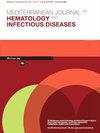治疗急性 B 淋巴细胞白血病的 Blinatumomab。
IF 1.5
4区 医学
Q3 HEMATOLOGY
Mediterranean Journal of Hematology and Infectious Diseases
Pub Date : 2024-09-01
DOI:10.4084/mjhid.2024.070
引用次数: 0
摘要
Blinatumomab是一种CD19-CD3双特异性T细胞诱导剂(BiTE),它有两个重组单链可变片段,能暂时连接CD3+ T细胞和CD19+ B细胞,导致T细胞介导的肿瘤性B细胞裂解。接受这种药物治疗的 B-ALL 患者的最小残留病(MRD)阴性反应率和长期总生存率均有所提高。这些成功的治疗案例促使 FDA 批准该药用于治疗难治性/复发性和 MRD 阳性的 B-ALL 患者。此外,最近对新诊断的B-ALL患者进行的研究还促使费城染色体阳性患者开发出了基于酪氨酸激酶抑制剂加Blinatumomab的无化疗方案,并促使费城染色体阴性患者在巩固治疗阶段使用含有Blinatumomab的化疗方案,从而改善了治疗效果。本文章由计算机程序翻译,如有差异,请以英文原文为准。
Blinatumomab in the Therapy of Acute B-Lymphoid Leukemia.
Blinatumomab, a CD19-CD3 bispecific T cell engager (BiTE), has two recombinant single-chain variable fragments that temporarily link CD3+ T cells and CD19+ B cells, leading to the T cell-mediated lysis of neoplastic B cells. Improved minimal residual disease (MRD)-negative response rates and long-term overall survival have been observed in B-ALL patients who received this drug. These therapeutic successes have led to FDA approval for refractory/relapsed and MRD-positive B-ALL patients. Furthermore, recent studies in newly diagnosed B-ALL patients have led in Philadelphia chromosome-positive patients to the development of chemotherapy-free regimens based on tyrosine kinase inhibitors plus Blinatumomab and in Philadelphia chromosome-negative patients to improvement in outcomes using chemotherapy regimens that have incorporated Blinatumomab in the consolidation phase of treatment.
求助全文
通过发布文献求助,成功后即可免费获取论文全文。
去求助
来源期刊

Mediterranean Journal of Hematology and Infectious Diseases
Medicine-Hematology
CiteScore
4.20
自引率
6.20%
发文量
113
审稿时长
12 weeks
期刊介绍:
Reciprocal interdependence between infectious and hematologic diseases (malignant and non-malignant) is well known. This relationship is particularly evident in Mediterranean countries. Parasitosis as Malaria, Leishmaniosis, B Hookworms, Teniasis, very common in the southeast Mediterranean area, infect about a billion people and manifest prevalently with anemia so that they are usually diagnosed mostly by experienced hematologist on blood or bone marrow smear. On the other hand, infections are also a significant problem in patients affected by hematological malignancies. The blood is the primary vector of HIV infection, which otherwise manifest with symptoms related to a reduction in T lymphocytes. In turn, infections can favor the insurgency of hematological malignancies. The causative relationship between Epstein-Barr virus infection, Helicobacter pylori, hepatitis C virus, HIV and lymphoproliferative diseases is well known.
 求助内容:
求助内容: 应助结果提醒方式:
应助结果提醒方式:


